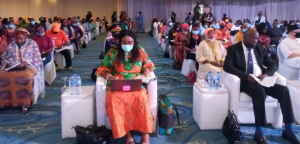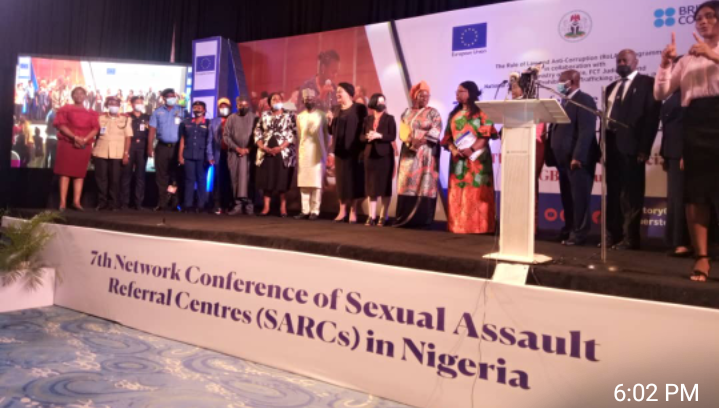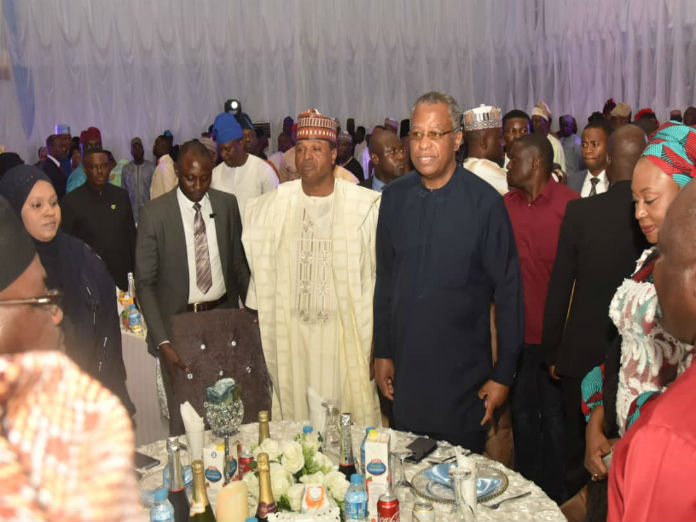Create Special Courts To Prosecute SGBV offenders- RoLAC Tells FGN
Maryam Aminu
For many years, there have been calls for the prosecution of cases of SGBV, in separate courts, it is for this reason RoLAC is campaigning this year for the separate judicial process.
Danladi Plang, National Programme Manager, RoLAC Programme, made this statement at the 7th Network Conference of Sexual Assault Referral Centres (SARCs) in Abuja
Plang amongst other stakeholders, called for the establishment of separate courts to prosecute the cases of Sexual and Gender-Based Violence.
Plang also emphasised the need for critical actors to collaborate in the fight as well as provide a platform for experts to identify policy options, legal innovations, best practices, processes for the establishment and modalities for operation.
For many years, there have been calls for the prosecution of cases of SGBV, in separate courts, it is for this reason RoLAC is campaigning this year for the separate judicial process.
“The main objective of this conference is to identify policy options, recommendations and action for the efficient disposal of rights of victims and mobilise relevant actors.”
Speaking further, he stated that from last year a lot has happened as most states have domesticated the VAPP law and now have more SARC, adding that about 32 have been created, with the latest being Kebbi State.
Plang said: “Of course more victims and survivors are being supported by the Centers.
“As at June this year, we have about 21,000 survivors that are supported.
“In the last eight years out of this 21,000, about 6900 are being cared for by the SARC, which represents about 30 per cent of survivors.
“There is a serious consensus that the prosecution of offenders is key even as the cases reported are very few.
“There is a disproportionately higher number of victims to the perpetrators and of course they deserve justice as different as they may be.”
While delivering her speech, the Honourable Minister of Women Affairs and Social Development, Dame Pauline Tallen, called for stiff punishment to Sexual and Gender-Based Violence offenders in the country to scare others.
The Minister, who described the rising cases of SGBV in Nigeria, called for action while supporting the laws enacted by Kaduna State Government, which prescribed castration as a punishment to sexual assault offenders.
According to Tallen, “two or more of those sexual offenders should be castrated publicly” to serve as an example to others.
Quoting statistics, Tallen disclosed that the National Situation Room and Dashboard set up in the Federal Ministry of Women Affairs under the UN/EU Spotlight initiative targeting Six States supported by UNDP as of November 24, 2021, totalled number of cases reported to be 5,204, of which 3,125 survivors are demanding justice and only 33 perpetrators have so far been convicted, representing 0.51 per cent.
The fatal cases are 160, closed cases 231, while open cases (cases pending in court) are 972.
Tallen urged all relevant Ministries to engage, amplify advocacy to the States and rural communities for further enlightenment in this regard.

Reacting to that, the UN Women Country Representative, Comfort Lamptey, emphasised the need to join forces for advocacy and sensitization in curbing and ending the scourge of Gender-Based Violence from the community and our nations at large.
Lamptey noted that this year marks 30 years since the start of the 16 days activism campaign, reiterating that globally one in three women have been abused sexually and in Nigeria, 28 per cent of women have been abused before the age of 15 and 49 in one form of violence.
Speaking further, she noted that 16 per cent of women and girls have experienced this from spouses and home as in times of crisis the number rises.
She said: “During the first month of the lockdown directive from the FG, there was massive increase in the record of GBV cases.
“One in four women feel unsafe at home, since the onset of COVID 19.
“Outside the home, women also feel increasingly unsafe.
“This is a wake-up call for solving the problem at its root, while this problem remains pervasive, it is not preventable.
“Preventive methods are critical to ending GBV.
“It requires a commitment from all of us to work against the harmful practice that sustains gender inequality.
“More men need to step up to form forces with some right advocates through the UNWomen joint spotlight initiative to engage stakeholders in the community, traditional rulers to address some of the patriarchal norms that encourage gender inequality.
“Provide a comprehensive support system that will help survivor centred services, which include police, justice and social sectors, as well as sufficient financing for women, are essential ingredients to the fight against GBV.
“The past two years in Nigeria have experienced progress on the domestication of the VAPP Act to the law since it was passed in 2015, with a total of 30 states out of 36 in Nigeria.
“This commendable feat was achieved by the declaration of a state of emergency on GBV by the Nigeria Governors’ Forum in 2020.
“We need to ensure that the federal and state governments ensure that GBV survivors have full access to justice, with reliable prosecution of perpetrators.
“Put women at the centre of responses, including the policy situation solutions, strengthen services, including justice for women who experience violence and invest in prevention efforts to end Violence Against Women and Girls.”
In the same vein, Ambassador, Delegation of the European Union to Nigeria and ECOWAS, Samuela Isopi, identified impunity as fuel for GBV.
According to Isopi: “This type of violence remains largely unreported due to the stigma and shame surrounding it and the lack of confidence in authorities.
“As a result, many perpetrators remain free and unpunished.
“Impunity contributes to fuel GBV.
“If we do not stop impunity, we may not be able to stop GBV.
“The government has a critical role in maintaining and sustaining of the separate court for it to succeed.
“The government needs to take ownership of this court by allocating resources to address the need of the people.”
Justice Ibrahim Muhammad, Chief Justice of the Federation, said: “In creating a special court, we need to have trained judges and this is a lot of work.
“This is an issue that takes more than talking.Things must be in place, he said.
“When we have everything set, then we can start talking of special courts.”
Muhammad who was represented by Justice Amina Audi, said “ we need to put in place all other structures that will make this succeed before we go advocating for special courts, he advised.
“Rural areas need to have a gender desk of institutions with specialised personnel to attend to vulnerable victims.
“The first contact for victims needs to be able to bring them out of despair”
Since the Conference last year, a lot has happened: More states have passed VAPP laws (e.g., Edo and Adamawa); more SARCs have been set up (e.g., Kebbi); and more victims have been supported (of the 21000 survivors supported by the SARCs in 8 years, 6939 (32%) were supported in the last 12 months. We pay tribute to the SARC personnel that are playing a very important front-line role in coordinating support for survivors’ day and night, come rain come shine.
But sexual and gender base violence remains a serious issue. Last year we engaged some comedians on the theme ‘Rape is no joke. ‘ There can be no Emoji for it. Rather, concerted efforts to deal with it. There is a consensus that the weakest link in the effort to fight SGBV is in the prosecution of offenders. Even within the relatively small number of cases reported to SARCs (and other service providers), the number of these cases that are prosecuted are few compared to the number of reports. There are disproportionately higher numbers of victims of sexual assault who do not receive justice for the crimes committed against them, than there are victims who actually receive the justice they deserve. These survivors include the weakest in our communities – a 3-month-old toddler; a grand ma over 7 years old; a person with disability, etc.
For many years there has been a steady call for the establishment or designation of fast-track or special SGBV courts in Nigeria to guarantee effective legal protection, access to justice and remedies for SGBV survivors. It is for this reason that this year’s SARC Conference, and indeed other RoLAC activities for the 16 days campaign this year are focussed on amplifying the call for fast tracking the judicial process for SGBV cases by providing the platform for experts to identify and debate policy options, legal innovations and best practices and processes for the establishment and designation of special courts for SGBV, as well as modalities for their operation.
Lagos state already offers a strong example of the application of specialised SGBV courts in Nigeria. The Chief Judge of Lagos state will be making presentation on the experience so far, later in the second session today
Outside Nigeria, one of the presentations at the launch of the 2021 World Justice Rule of Law index 2021 launch was by the representative of the Asian Development Bank which supports work on SGBV in Pakistan including the establishment of specialised court in one District. According to the Bank, the GBV court within one year has increased conviction rates in rape cases from 2% to 20%.
One admits there will be advantages as well as disadvantages. Let’s focus on the possibilities
The objectives of the conference therefore are to:
To identify relevant policy options, recommendations, and actions for the efficient disposal of SGBV cases which includes designation or establishment of specialised courts for SGBV cases
To sensitise and mobilise relevant actors and stakeholders around the imperative for and relevance of special courts for SGBV in the context of Nigeria’s legislative, policy and social environment
We urge you all to seize the opportunity to discuss and debate these issues and agree on some concrete actions that will make an additional difference for SGBV survivors, Audi concluded
In the remarks of Hon. Attorney General of the Federation and Federal Ministry of Justice who was represented by the Director of Planning, Research and Statistics, Federal Ministry of Justice,Mrs Victoria Fila Ojogbane said” The Federal Ministry of Justice is seriously committed to the fight against SGBV in Nigeria.”
The ministry will not relent in it’s advocacy to the judiciary for the need to designate and establish specialized GBV in Nigeria, Fila assured.
” I believe creation of special courts to handle cases of Sexual and Gender Base Violence will improve the effectiveness of courts services, she added.




